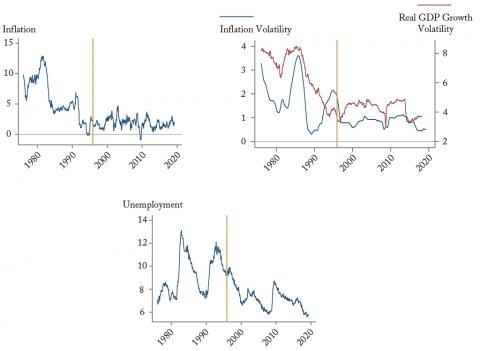From: William B.P. Robson and Jeremy M. Kronick
To: Governing Council, Bank of Canada
Date: June 10, 2019
Re: Full Employment not the Job for Central Bankers
Senator Diane Bellemare has launched an inquiry into revising the Bank of Canada Act to add full employment to the bank’s mandate. Senator Bellemare’s inquiry appears to reflect a view that the bank’s current framework – expressed in periodic agreements with the Parliament of Canada – of pursuing 2 percent inflation is deficient, and that requiring the bank to pursue an explicit goal related to jobs would improve it.
An alternative take on the situation is that the current framework is a sensible, and highly successful, way for the bank to pursue its existing mandate – which is in the Bank of Canada Act and already refers, among other goals, to mitigating employment fluctuations, and promoting the economic and financial welfare of Canada.
Because inflation in Canada has been low and stable for almost 25 years, it is worth recalling that inflation during the 25 years before that was higher and less stable. High, unstable inflation complicates everyday buying and selling, and can make nonsense of longer-term decisions like those around mortgages and retirement.
Unhappiness with high, unstable inflation inspired a change to inflation targeting in the early 1990s. The Bank of Canada’s mandate did not change – the agreements with Parliament on inflation control made explicit that preserving the purchasing power of money was the surest route to accomplishing its goals related to employment and welfare more generally.
Inflation targeting has been a success. The bank’s target has been to keep annual increases in the CPI in a range of 1-3 percent (mid-point 2 percent) since the end of 1995. In the 280 months since then, inflation has been within that range 219 months – fully 78 percent of the time. The same pattern can be seen in the unemployment rate and economic volatility in the last 25 years compared to the 25 years that preceded it as shown in the figures below.
There is more to life than low inflation. Senator Bellemare’s call for an inquiry cites, among other challenges, climate change, protectionism, and income inequality. She could have added much else: demographic aging and low returns on saving are also major concerns for many Canadians. But to the extent that Canadian policymakers can address these issues, unelected central bankers are not the right people for the job.
Nevertheless, there are ways to make monetary policy more effective in stimulating the type of economic rebound we are used to seeing after recessions.
Perhaps annual changes are too short a horizon for inflation targets. Going to a longer period – 24 months, say – would give the bank scope to let the economy run hotter for a period without causing a confidence-damaging overshoot of its target. Tactically, the bank could probably be more energetic in fostering faster money growth when the economy is slowing.
Tweaks like these do not require any changes to the Bank of Canada’s mandate – which, to repeat, already refers to employment, and Canada’s economic and financial welfare. A thorough inquiry in the Senate would likely conclude – indeed, should conclude – that targeting low and stable inflation has been a major success for Canadians.
William B.P. Robson is President and CEO of the C.D. Howe Institute and Jeremy M. Kronick is Associate Director, Research, at the C.D. Howe Institute.
To send a comment or leave feedback, email us at blog@cdhowe.org.
The views expressed here are those of the authors. The C.D. Howe Institute does not take corporate positions on policy matters.






